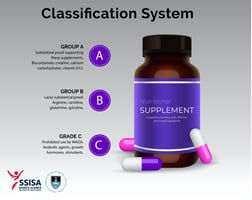In a world focused on convenience, smoothies are at the top of the list when it comes to quick...
Ketone Bodies - Fad or Fix?
Ketone products are rapidly increasing in popularity in the health and wellness sphere as well as on grocery store shelves in nutrition isles. But before we jump on the ketone bandwagon, it’s important that we ask: do they actually work?
Ketone bodies are organic compounds derived from fats during times of starvation or intense carbohydrate restriction (1–5). They can be produced endogenously within the body by the liver, or ingested exogenously in a powder, salt, or ester form (1). There are three different types of ketones, with the most popular being b-hydroxybutyrate (1), commonly known as BHB. A “Ketogenic diet” is a diet high in fat, where approximately 80% of a person’s daily intake is derived from fats, such as butter, cream, avocado or bacon (5). When following a diet high in fat, ketone blood levels increase to 2 mmol/L and the body enters the physiological state known as nutritional ketosis (1). In theory, once in ketosis the body no longer relies on carbohydrates and glucose metabolization for energy, but instead starts using its own fat. Achieving nutritional ketosis can be difficult, due to the diet being very rich in fats, and extremely low in carbohydrates. Following a diet low in carbohydrates (20 – 50g per day, the equivalent of 2 slices of bread) can lead to feelings of fatigue, headaches, and nausea (1,3,4). Reaching ketosis can take anywhere from 1 - 4 weeks for the body to adapt and begin using its own fat stores . The proposed “quick fix” to bypass having to undergo weeks of a ketogenic diet is to eat ketone bodies (i.e., exogenous ketones). The claim is that ketosis can be achieved within a few hours instead of weeks. But how effective are exogenous ketones?

Studies show that ingesting something known as ketone ester ((R)-3-hydroxybutyl (R)-3-hydroxybutyrate) is effective in increasing BHB blood levels to 5 mmol/L, which is similar to changes in blood samples seen when following a keto diet (5). However, the ketone bodies found in commercially available supplementation are not esters, but rather ketone salts. Ketone salts are typically a BHB combined with sodium. Clinical trials involving ketone salts show that they are not able to sufficiently increase blood ketone levels past 2 mmol/L (5). Additionally, studies have shown that even with elevated blood ketone levels there was little change in fuel usage in the body (5). More importantly, the study participants reported negative gastrointestinal tract side effects such as nausea, diarrhea, and abdominal discomfort. Additionally, there is evidence to suggest that high amounts of commercially available ketone salts can result in acidosis and other negative side effects(5). Given the poor evidence for the effectiveness of eating exogenous ketones as well as the stronger evidence of serious adverse side effects, ketone body supplementation may not be a viable alternative to the ketogenic diet.
With very little evidence supporting use of exogenous ketones to alter fuel usage in the body as well as the evidence for adverse side effects, it might be wise to treat exogenous ketones with caution. It seems that when it comes to ketones, they may be more fad than fix.
To bring you the most evidence-based and cutting information in the fields of sports and exercise science and health, SSISA works alongside the UCT Research Centre for Health through Physical Activity, Lifestyle and Sport (HPALS) to disseminate the latest research. HPALS research focuses on optimizing human performance and promoting health and well-being through physical activity, sports participation, healthy eating and good sleep hygiene. Their work begins at the DNA, to the human performance laboratory and ultimately to the community. To read more about the Health through Physical Activity, Lifestyle and Research Centre, Division of Physiological Sciences at the University of Cape Town, please see the HPALS website or email Ayesha Hendricks for more information about applications for MSc/PhD research programmes.
To get in touch with the Sports Science Institute of South Africa Group for Research Implementation and Translation (GRIT) Research Consultants, get in touch with Warren Lucas at research@ssisa.com or call 021 650 5728 for enquiries. Read more about the SSISA GRIT Team here.
Yours in Sports Science,
Sports Science Institute of South Africa
References:
- Evans M, Cogan KE, Egan B. Metabolism of ketone bodies during exercise and training: physiological basis for exogenous supplementation. Vol. 595, Journal of Physiology. Blackwell Publishing Ltd; 2017. p. 2857–71.
- Kackley ML, Brownlow ML, Buga A, Crabtree CD, Sapper TN, O’Connor A, et al. The effects of a 6-week controlled, hypocaloric ketogenic diet, with and without exogenous ketone salts, on cognitive performance and mood states in overweight and obese adults. Front Neurosci. 2022 Sep 30;16.
- Pinckaers PJM, Churchward-Venne TA, Bailey D, van Loon LJC. Ketone Bodies and Exercise Performance: The Next Magic Bullet or Merely Hype? Sports Medicine. 2017 Mar 1;47(3):383–91.
- Shaw DM, Merien F, Braakhuis A, Maunder ED, Dulson DK. Effect of a Ketogenic Diet on Submaximal Exercise Capacity and Efficiency in Runners. Med Sci Sports Exerc. 2019 Oct 1;51(10):2135–46.
- Margolis LM, O’Fallon KS. Utility of Ketone Supplementation to Enhance Physical Performance: A Systematic Review. Vol. 11, Advances in Nutrition. Oxford University Press; 2020. p. 412–9.


